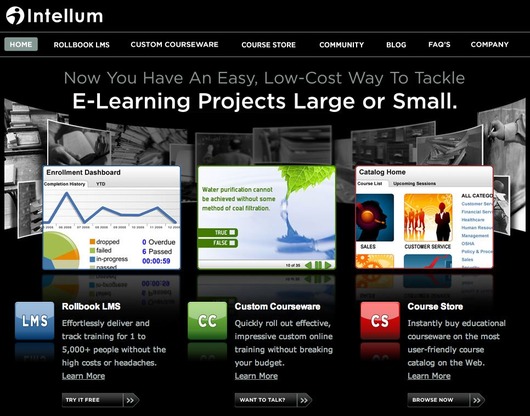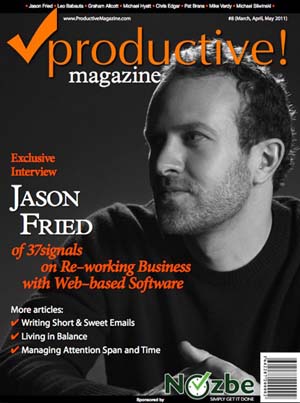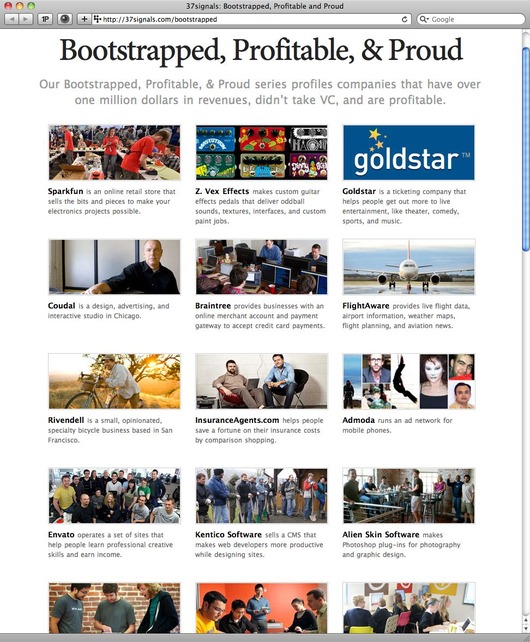In this Fast Company video, Jason offers tips on creating a productive workspace.
SvN Flashback: Product roadmaps are dangerous
Jason 30 Jan 2006 — An email from a reader:
At every company I work at, I keep seeing product roadmaps with qtr by qtr delivery of different features – they typically go out 1-2 years. Of course the product roadmap is out-of-date almost immediately because knowledge is constantly gained from market analysis and interaction with customers. My question is do you guys do product roadmaps? If so, do you put times schedules around them? I’d love to see your comments on this stuff…
Our answer: Product roadmaps are dangerous. They close your eyes and often put you on the wrong path.
One of the tenets of the Getting Real process is the idea that the future should drive the future. When you let a product roadmap guide you you let the past drive the future. You’re saying “6 months ago I knew what 18 months from now would look like.” You’re saying “I’m not going to pay attention to now, I’m going to pay attention to then.” You’re saying “I should be working at the Psychic Friends Network.”
Instead of the roadmap, just look out a few weeks at a time. Work on the next most important thing. What’s the point of a long list when you can’t work on everything at once anyway? Finish what’s important now and then figure out what’s important next. One step at a time.
This doesn’t mean you can’t have ideas of where you think your product should go or future features you’d like to implement. This doesn’t mean you shouldn’t have a vision. It does mean that you need to pay attention to reality. Reality is where you’ll find the best answers. And you’re never closer to reality than right now. The further you get from now, the less you know. And the less you know, the worse your decisions will be.
The other problem with roadmaps is the expectations game. People expect you to deliver what you say you will in 4, 5, 6 months. And what if you have a better idea? What if there’s a shift in the market that you need to address? What if what you thought wasn’t what actually happened? Any change in the roadmap nullifies the roadmap. Then the map isn’t a map at all.
Try it. It’s liberating and certainly more satisfying than following a plan you know is outdated.
Most people think the way you figure [ideas] out is doing a focus group. But the really really successful ones are ones people never thought they wanted. Figure out a way to delight the consumer; You need to figure out what it is. Then use the focus group to see if you’re crazy.
Notes from a talk by Jonathan Kaplan, founder and chief executive of Pure Digital. The Flip creator’s next project: a chain of grilled-cheese-and-soup restaurants.
Every Bootstrapped, Profitable, & Proud in one place
Our Bootstrapped, Profitable, & Proud series now has its own index page.
Spinfree had a dirty little secret: It wasn’t really a “company.” It was just me…[But] when describing Spinfree, I always spoke in terms of we, us, the team, or our offices. I trained myself always to use the collective first person—on the phone while pitching to potential clients, on Spinfree’s website, in the proposals I submitted…Why the bluffing? I was young and inexperienced and felt like people would not take Spinfree seriously if they knew that it was just me…I wish I knew then what I know now: Being small is nothing to be insecure or ashamed about. Small is great. Small is independence. Small is opportunity. Celebrate it. Don’t hide from it.
Excerpt from “Don’t Exaggerate Your Size,” Jason’s latest column for Inc. Magazine (more of Jason’s Inc. columns)
How Intellum switched from making a plan for VCs to making a product for customers
Intellum is an Atlanta-based company that offers low-cost solutions for e-learning projects. CEO Chip Ramsey will answer reader questions in the comments section today (6/1/11).
 “You may not have heard of us, but chances are you run into people on a daily basis that have,” says Intellum CEO Chip Ramsey (right). “You know the security guard in your building? We probably train him. Walked by a Coke machine recently? There’s a good chance we trained the guy who filled it.”
“You may not have heard of us, but chances are you run into people on a daily basis that have,” says Intellum CEO Chip Ramsey (right). “You know the security guard in your building? We probably train him. Walked by a Coke machine recently? There’s a good chance we trained the guy who filled it.”
The company processes millions of student enrollments annually in over 11,000 cities and 65 countries. One day they’ll be in Palo Alto working with Facebook, the next in Atlanta with The Home Depot.
The initial idea
It was a long route to get there, though. It started back in 2000 with Ramsey’s stepfather, who worked for the Occupational Safety and Health Administration (OSHA) and spoke frequently about the difficulty and expense of complying with government regulations. “The initial idea was to build a hosted web app to simplify regulatory compliance and in the process, help employees avoid injuries,” explains Ramsey. “We’ve evolved over the years, but that’s how it started.”
The original funding plan was to raise $500k from investors, but Ramsey’s team fell short of that goal. It instead wound up raising $175k from friends and family. “I would love to drop some sanctimonious rant about how we were too good to take VC funds and were wise beyond our years regarding building a lasting business. But the truth was we did try to go the more traditional fund raising route. We spent months in bars, coffee houses, and hotel lobbies writing our business plan, meeting with whomever would see us, rewriting the business plan, and so on. We tried it all; We just failed. And despite the cursing under our breath that went on after each VC ‘didn’t get it,’ the truth is they were right to turn us down. Three twenty-five year old friends, barely out of college with little work experience and no product to sell probably aren’t the most qualified people to spend the millions of dollars our business plan called for.”
So what happened with that $175k? “We spent it all in three months and, at the end of the day, had nothing to show for it,” admits Ramsey. “The money was spent on salaries and professional services fees — fees for lawyers to draft our PPM and contracts, fees for financial experts to come up with our valuation, fees for programmers to develop software that never worked, and, my personal favorite, fees for consultants to coach us on how to raise money.”

Intellum’s home page today.
Course correction
The evaporating funds meant a change of course was needed. “For months, we had been writing a plan and basing decisions on what investors told us they wanted to see,” explains Ramsey. ”’You need more grey hair.’ Okay, we’ll hire a more experienced CEO, whose salary will burn through all our capital. ‘The mobile web is heating up. You should really have a mobile offering.’ Sure, we’ll waste a month of consulting hours on a prototype even though no one’s phone can actually display it yet. ‘If you were smart, you’d be looking for a big name insurance partner.’ Great idea, we’ll pull some strings and fly all over the place to meet with people, who don’t necessarily understand technology and already have more on their plate than they can handle.”
“We had been writing a plan and basing decisions on what investors told us they wanted to see.”
All that chasing left them living off credit card debt and peanut butter and jelly sandwiches. So the team made a decision: Stop chasing a funding event and figure out how to make money.
Continued…Whatever interests you naturally is the most important thing to work on
Below, David talks about motivation. Excerpted from Episode #26 of the 37signals Podcast (listen or read the transcript).
I have a very hard to impossible time forcing myself to do things that I don’t want to do.
When I feel that lack of motivation, there’s always a reason. I instinctually know whatever I’m working on is not actually worth it — that all this effort I’m about to put in is not going to pay off. Or maybe I’m just not good at what I’m trying to do. Either way, it feels like a waste of time.
Plus, I find it hard to have a wide array of things that I’m interested in at the same time. I usually pick one thing and I get really interested in solving that. Any other task that doesn’t fall under that banner has a hard time capturing my imagination and getting done. I just put that on the back burner until whatever I’m naturally interested in gets completed or my motivation runs out.
When you have a natural interest in something, your productivity goes through the roof. Even though whatever I’m naturally interested in might not, from an objective point of view, be the most important thing to work on at that time, it is the most important thing to work on because of the productivity gains I get out of just being super fired-up about it. I have to get that out of my system. And I wind up doing things really quickly.
When you’re not working on something you’re inspired by, your efficiency is so much lower. You find more moments in the day to let yourself be distracted by email or reading on the Web or something else. That’s usually the key smell I detect when I’m working on something I don’t really want to be working on: I check email much more frequently and I engage in chats about things that aren’t related to what I should be working on.
On the flip side, when I’m working on something I’m really fired up about, I couldn’t care less about new posts on Twitter or whatever. Instead, I get whatever I’m working on done right away.

Productive Magazine 8 (PDF) features Jason discussing simplicity, REWORK, and web-based software.
SvN Flashback: Eureka! We’re editors
I was having lunch today with some editors of a local weekly. After listening to them talk about what they do I realized that we do it too. We’re editors.
They edit articles, we edit software.
We prune it. We clip off the extra features like they clip off the extra words. We trim the interface like they trim a sentence. We chop products in half like they ask for 5000 words instead of 10,000.
The editing process is what makes a great product. Editing the feature list, editing customer requests, editing the interface, editing the code, editing the marketing, editing the copywriting. It’s not about designing or writing or coding, it’s about trimming those weeds back before they ruin the lawn.
So keep that in mind when you write, design, code, or promote. Good editors build great software.
You’re much less likely to develop a clue if you have a lot of cash. When you have a lot of cash, you can delude yourself for a very long time and still pay the bills. There’s nothing that will bring realism into your world as quickly as realizing that you’re out of cash. That is a smack of real life that will instill sense in almost anybody.


